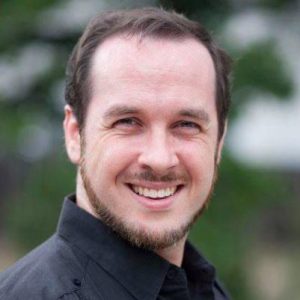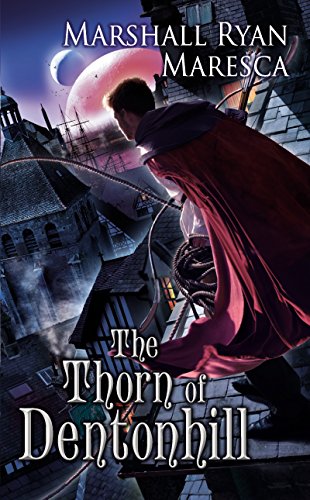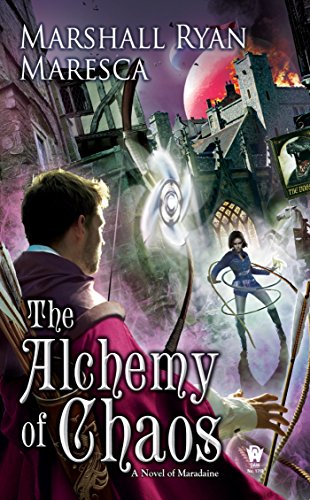By Carl Slaughter: Marshall Ryan Maresca’s tale of murder and magic, secrets and lies, policemen and vigilantes, misfits and criminals, professors and sidekicks, conspiracies and guerilla warfare continues to unfold with the release of the second book in his first trilogy, Alchemy of Chaos, and the second book in his second trilogy, Import of Intrigue.
His main characters continue on their journey of discovery and maturity, decisions and consequences, goals and limits, risks and relationships. They frequently make mistakes and are frequently overwhelmed, but they never lose their sense of destiny and their sense of justice.
Meanwhile a third trilogy has been scheduled and more stories are in the works or in the planning, all in the same universe. Other fictional universes and other genres are waiting their turn in line. All this under the experienced oversight of DAW editors.
When he first approached me about an interview/feature, only cursory information about the series was available at the time and I was not impressed with the premise. I thought, “Change the school from a magic academy to a computer academy, change the skills from magic skills to computer skills, change the artifacts to software, or whatever, and the story is essentially the same.”
Big mistake. Never underestimate the power of compelling characters. The more I hear about these characters, the more I am drawn to them. I am mighty curious about the characters in those first two trilogies. In this follow-up interview, he satisfies my curiosity – within the boundaries of spoilers and deadlines.
CARL SLAUGHTER: The main character in Import of Intrigue is an uncircled mage. What exactly is an uncircled mage?
MARSHALL RYAN MARESCA: For mages to practice their craft in Maradaine, they need to be part of a Circle, which is a legal organization that provides training and accountability, but also that protects the mage from egregious arrest or prosecution. An Uncircled Mage is someone who has the knack for performing magic, but lacks the formal training, and thus is not part of any circle. This can happen a few different ways, but in Minox’s case, his magical abilities didn’t manifest until he was much older, when he was already in the constabulary.
CS: What sort of unique circumstances does a police detective who is an uncircled mage find himself in?
MRM: Since the Circles exist to give mages legal protection from constabulary harassment, they do not cooperate with the Constabulary at all. Which means that Minox—a man with deep familial ties to the Constabulary, who always wanted to be an Inspector—had to make the choice to not learn how to use his powers, and be shunned by other mages. But it also means that many in the Constabulary, who distrust and fear mages, don’t want to work with him. He’s on the outside in both worlds.
CS: His partner faked her credentials. Faking credentials as a constabulary is easy enough. But how does she fake her skills as a crime investigator? If you can’t solve a crime, won’t your partner and superior and eventually other police colleagues realize you’re a fake?
MRM: Satrine has the skills. She was a spy in Druth Intelligence for years, and her time being married to an inspector gave her a familiarity with the procedures and methods of the constabulary. She’s brilliant and she’s observant. Doing the job, solving the crimes—that’s never going to be a problem for her.
CS: What sort of chemistry do these 2 characters have?
MRM: Satrine and Minox both recognize competence and capability in each other. They recognize their mutual regard for the job and their dedication to doing it well. They click as partners because they each trust that the other one is trying to do the job as well as they possibly can, and have the ability to back that up.
CS: What about our original hero from the first series. What sort of progress has he made in developing his magic skills and waging war against his father’s murderer?
MRM: Veranix gets put on his path from vigilante to hero in The Thorn of Dentonhill. The main thing he has to contend with in The Alchemy of Chaos and beyond is finding out that declaring himself a hero means taking on responsibility, above and beyond his own vengeance. If the drugs are coming into the campus or adjoining neighborhoods, if other dangers appear that are beyond the normal authorities, if his identity is being appropriated—what is he obliged to do to handle those things? Is he obliged? That his war against the drug kingpin will involve battles he never anticipated. That’s what he needs to struggle with as that series progresses.
CS: Is he still maintaining his secret identity as a vigilante or does his circle of confidants increase?
MRM: Maintaining his secret remains a challenge. Sometimes that involves bringing new people into his circle of trust, and sometimes that means extreme choices. Sometimes trusting someone is the extreme choice.
CS: He’s a college student. Surely he has a dating life. How does his dating life affect his career in magic and his career in crime fighting.
MRM: On one hand, romance is the last thing he wants to think about. He’s got so much on his plate. On the other hand—he’s still a teenage boy, and thus he’s still a ball of hormones and confusion. He’s still drawn to the people he’s attracted to, and not always sure what to do about that—if he even should do something about it.
The key relationship in his life is with Kaiana, the young woman who works on campus and keeps his secret safe. She’s his best friend, and he is attracted to her—but does that necessarily mean they should be romantic, especially if he’s not really sure if that’s something that interests her? One thing I want to explore is how—especially as a teenager—these things are confusing and unclear and don’t always go how they “ought” to go.
CS: Once he avenges his father murder, is he going to take off his cap and mask?
MRM: Again, it ties into responsibility and burden. If he avenges his father’s murder, will he be “done”? Or will he have created an even bigger mess? And if so… who’s responsibility is that mess?
CS: Do the detectives and the vigilante have any interaction?
MRM: Things have been building to that– Alchemy of Chaos showed one of Minox’s siblings on the constabulary force in Veranix’s neighborhood. We’ll see that pushed further in The Imposters of Aventil— coming out in October next year. That book will mark the first proper “crossover”, but far from the last.
CS: Are the kingpins in the first series, the conspirators in the second series, and the arsonists in the third series connected?
MRM: The clearest answer I can give you right now (without delving into pure spoiler territory) is that there are a lot of things simmering under the surface, and the tendrils of those things all touch each other in different ways. So there are underlying sources for these different challenges my heroes are facing, and those sources also have their interconnections.
CS: What about the magic premise. Is being a magician in the genes, the artifacts, the gadgets, or the chemicals?
MRM: It’s in the genes, to a degree. There isn’t a clear “this family has magic” or anything like that—but a small portion of people are born with the knack to channel and shape the energy of magic (called “numina” by the academics). Within the context of the world, there isn’t any noted pattern to who gets born with the knack, just that it usually manifests around puberty. Minox—our uncircled mage inspector—is the rare exception that his ability manifested well into adulthood.
CS: How does magic fit into the society of this fictional universe?
MRM: It’s still something that’s trying to be understood. Of course, it’s always been around, but for centuries Druth society treated it in a very hostile way—incarcerating or lynching anyone who manifested talent. Circle laws and university sanctioned training of magic were part of a desire to change that, to reshape the public attitudes—make society safe for mages, integrate what they can do into everyday life. They’re also trying to understand what it is and what it means, approaching it with scientific rigor. But a lot of people don’t like that, or are, at the very least, uncomfortable with that. So you see a society with a lot of tension when it comes to magic.
CS: Once all three trilogies are wrapped, are we going to revisit this fictional universe? Are we going to revisit any of the same heroes? Are the main characters in all three series going to interact in a grand finale?
MRM: Hmmm… how to answer this question without getting too spoilery. OK, I have a grand, mad plan for Maradaine that involves three phases. Phase I will consist of the first three books for these three series, as well as the first three books of a fourth series that I’m provisionally calling The Maradaine Elite. Phase I, if I pull it off well, will finish in a way that is satisfying along the lines of the grander arcs, without closing the doors for what Phases II and III will need.
That’s a complicated way of saying “yes, but….”. And that’s pretty much the answer at its core.
CS: Who would play the main characters of the first and second series in a screen adaption?
MRM: This is a tough one, especially with the Thorn characters, because their young age makes the “appropriate actors” a constant moving target, and whoever would fit for playing Veranix and Kaiana are actors who are just starting their careers. So I’m not sure who would fit those roles. Ideally, Veranix and Kaiana and many other characters would be played someone who is making it their break-out role.
The Constabulary characters are easier. After the first book came out I watched The Killing, and it was eerie how much Mireille Enos and Joel Kinnaman—playing mismatched detectives partnered to solve a murder—physically matched how I saw Satrine and Minox. I mean, their characters are completely different in that show, but they look perfect.
CS: Any new fictional universes and fictional characters in the works?
MRM: I have several things in the works, in various stages of development. There are a few things that are in the world of Maradaine, but outside of the confines of that city—I’m still figuring out what sort of format that will take, but it will be new characters (or spotlight on existing minor characters). Those will likely be novella-length works or standalone novels. I’ve also been working on a space opera for a while, but that’s still coming together– it’s about two-thirds of a novel so far, but it still needs some further development. I hope to have something concrete to say about that within the next calendar year. And there are a few other fantasy concepts in brand new worlds that are brewing… my worldbuilding process is always long and open-ended, so I can’t say when that will be ready to properly talk about. Of course, as I have plenty of things already planned and in the works, so there’s no rush there. I’m happy with the current pace I’m working at.
Discover more from File 770
Subscribe to get the latest posts sent to your email.




Pingback: Perils of the Writer: Interviews – MARSHALL RYAN MARESCA